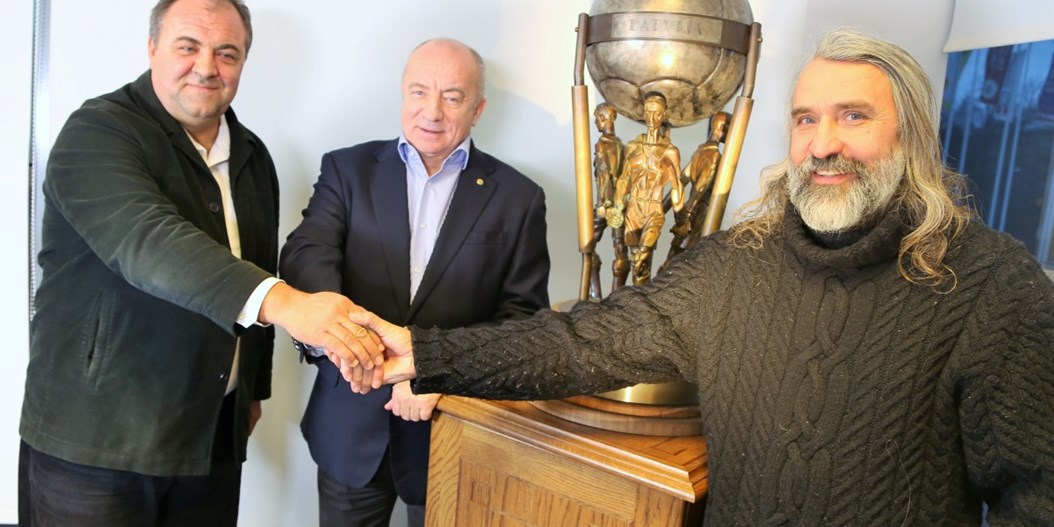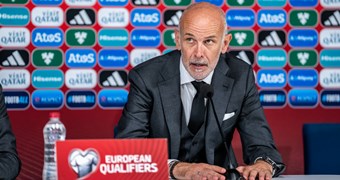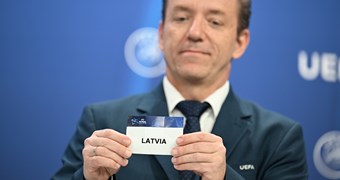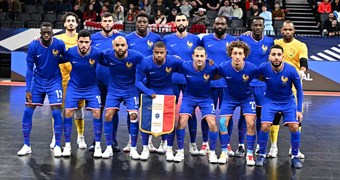The 2016 edition of the oldest football tournament for national teams in Europe – the Baltic Cup competition – will be staged from May 29 until June 4 in a new format with games to be carried out in all three Baltic states. As decided in the organizing meeting on November 30 in Riga by the representatives of Latvian, Lithuanian and Estonian Football Federations, the tournament will be carried out without the participation of Finland. The 26th edition of the Baltic Cup will be unveiled on May 29 with a match between Lithuania and Estonia.
Baltic Cup 2016 organisational meeting and federation representatives comments (30.11.2015.)
A new format, football in all three Baltic states
As part of the agreement, hereafter the shared football festivities between Latvia, Lithuania and Estonia will be staged under the idea of “The Week of Football” where the first game will be hosted by the formal hosts of the tournament. Following the principle of rotation, the initial hosts of Baltic Cup 2016 are Lithuania, therefore Lithuania will host Estonia in the starting game of the competition on May 29. It is expected to be staged in Klaipeda.
The second game will take place on June 1 when Latvia will host Lithuania. The Secretary General of Latvian Football Federation Jānis Mežeckis states that Liepāja is being considered as the venue for the game, though the final decision will be taken on a later date. The final game of the tournament will take place in Estonia on June 4 with Latvia being the visiting team. The game is planned to be staged in Pärnu where a new football stadium is being built.
Bigger potential in sporting and commercial activities
The initiator for the changes in the structure of the tournament is the president of Estonian Football Federation Aivar Pohlak. His idea have been supported by the representatives of Latvian and Lithuanian Football Federations who share common views on sporting and commercial advantages such changed can bring. No additional participants of the tournament are planned in the nearest future.
Several key points were discussed during the organizing meeting that have risen through the changes of the format. It is planned that the games will be overseen by refereeing teams of six from the country whose team is not participating in the respective match. Though, the inspector of the game will be local. The representatives of the three national football federations have decided to form an organizing team in order to work on commercial and marketing aspects of the Baltic Cup.
All games between the national teams will begin at 19:00. Detailed regulations for the Baltic Cup are planned to be approved by January 31 of 2016.
The Under-21 teams to play Baltic Cup games one day in advance
Simultaneously it has been decided that the Under-21 teams will carry out their Baltic Cup games through similar format with respective matches to be staged one day prior to the games of the national teams. The venues for the matches of the Under-21 teams will be the same as for the national teams. If not possible, the venue will be chosen geographically as close as possible to the venues of the games for the national teams. These matches will start at 18:00 and will be overseen by neutral refereeing teams of four.
“Since we got back our independence all three federations have been trying to find a way how to reestablish the image of the Baltic Cup as it was before World War II. During recent tournaments the brake between matches has been up to one day, while in modern times you cannot play successfully if you have not had a brake of at least two full days. This influences the level of football. This and the idea of staging the matches in all three countries were the key aspects why such idea arose. Every team will be able to concentrate on every game, the sporting value of the tournament will be at its best. This will also allow the fans to follow their team. We hope this model will build up the feeling of a proper football competition for the Baltic states,” Aivar Pohlak, the president of Estonian Football Federation.
“Such format is much better for the players who will have the chance to rest between match days, as well as for the media and football fans. We plan to host the game of our national team in Klaipeda, while the Under-21 team will play in Palanga. In every match against our neighbors and on all levels it is very important for us to win. It has been like this forever and for such small countries it is still very important. We will to everything in our power to bring back the Baltic Cup trophy to Lithuania in 2016,” Robertas Tautkus, National Teams’ director of Lithuanian Football Federation.
“We cannot forget that the Baltic Cup is the oldest tournament for national football teams in Europe. The initiative for changing the format of the competition came from our Estonian colleagues while Finland decided to take no more part in the tournament. Thus Latvia, Lithuania and Estonia agreed upon a new format where every team will have one game at home and away. Similar to Europe, we will have “A Week of Football” in the Baltics, as well. Such structure of the tournament will be interesting both for the fans and the media. Baltic Cup, as every game of the national team, is very prestigious. We have lifted the Baltic Cup trophy for two consecutive years, and we would love to keep the trophy in our possession. The dates for the tournament are very appreciative in European context as well, because on May 28 Milan will host the final of the UEFA Champions league, while in June “EURO 2016” finals will begin in France. Events in European football will therefore support interest towards the Baltic Cup,” Jānis Mežeckis, Secretary General of Latvian Football Federation.
BALTIC CUP 2016
Match schedule
| Match day 1 | ||
| Saturday, May 28 | 18:00 | U-21 LITHUANIA – U-21 ESTONIA |
| Sunday, May 29 | 19:00 | LITHUANIA – ESTONIA |
| Match day 2 | ||
| Tuesday, May 31 | 18:00 | U-21 LATVIA – U-21 LITHUANIA |
| Wednesday, June 1 | 19:00 | LATVIA – LITHUANIA |
| Match day 3 | ||
| Friday, June 3 | 18:00 | U-21 ESTONIA – U-21 LATVIA |
| Saturday, June 4 | 19:00 | ESTONIA – LATVIA |
The history of the Baltic Cup
This is the oldest such tournament for national football teams in Europe. In spite of different times and events Baltic states have managed to salvage this tradition while for football fans this is a chance to gather together with their neighbors and witness the battles on the football pitch. The first edition of the Baltic Cup took place in 1928 in Tallinn. Previously this tournament was staged every year, while in nowadays it is organized once every two years in turns by Lithuania, Latvia and Estonia. In 2012 and 2014 the tournament was enriched by the participation of Finland while the format was of a knock-out competition (semifinals, final and a third place match).
The current holder of the Baltic Cup trophy is Latvian national football team that won against Lithuania (1:0) in the 2014 final in Liepāja. In total Latvia has won the trophy on 11 occasions, Lithuania has 10 titles under its belt, while Estonia have been crowned the champions only on 3 occasions – all before World War II.
Follow the history of the Baltic Cup in 2014 documentary directed by Roberts Vīksne.
Lithuanian Football Federation
Latvian Football Federation
Eesti Jalgpalli Liit





